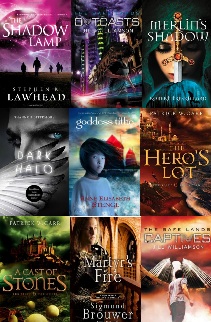We Need More Christian Fiction
I know we at Spec Faith have made a plea for Christian fiction (as opposed to simply fiction by Christians) before, but I want to voice my concerns again.
One school of thought is that Christians simply need to write well and God will be glorified and the job of the author is done. Another school of thought is that the gospel needs to be declared in every story, and an example of someone repenting and changing is most desirable.
The problem is that the world seems to be winning the story-telling battle. How many books and movies and manga and drama contain the prevailing concepts of a godless worldview? Well, perhaps not godless. Many replace God with a man-centric view. We simply need to look within. The power is in us. We can do all things.
There is an increase of books about transgender issues and challenging authority, about terrorism and domestic violence. We see stories that suggest intentional fraud in religion and others that promote a pantheistic worldview. The one thing we don’t see is a story with a positive Christian role model or someone who believes the Bible. More often than not a religious person is depicted as phony or greedy or not that serious about his beliefs.
Speculative fiction might lead the way in showing this march toward life lived without thought of God. Stories largely reflect the values of society, and the violence, the sexual perversion, the preoccupation with pleasure, the absence of an emphasis on integrity are symptoms of what fuels real life.
So, I wonder, how can a Christian write well in this environment?
I don’t think writing a “beautiful” story is enough. The most obvious reason is that a story isn’t actually beautiful unless it deals with a large truth, a universal need. So we may think some stories are wonderful because they have a great plot and such engaging characters, but if they don’t also address something vital to the human condition, they fall short.
At the same time, stories that offer the gospel message, while truthful and absolutely accurate, may fall on deaf ears simply because readers can’t relate.
Over and over critics of Christian fiction remind us that stories are different from sermons, and they are. That doesn’t mean that stories should be silent about the most important things in life. Rather, stories are vital because they involve a reader’s emotions. In addition, stories can say in fresh ways what readers may have missed in more didactic formats.
Why is Christian story-telling fighting to find a place in the market?
I love many books by Christians, and a short glimpse at the Spec Faith library will show you that there’s no lack of titles available. I’ve edited some of these authors, I’ve reviewed a number of the books, I’ve read far more for pure enjoyment. But none of the recent sci-fi or fantasy titles are reaching “across the aisle” to the general market. Oh, sure, some might in small numbers, but I don’t see anything like the Left Behind phenomenon or the way The Shake captured readers.
I don’t know why Christian fiction can’t regularly be read widely, not because it’s theology is controversial, but because it’s just that compelling that readers talk about it and recommend it and get excited about it.
Some of the best books I’ve read come up short in some significant way: I’ve read some with characters that are forgettable; I’ve read others with convoluted plots; I’ve also read some that seem little more than frivolous; and yes, I’ve read some that are preachy.
What this boils down to, I think, is writers focusing on some aspects of fiction, but not on all parts. So you have some stories that have wonderful characters, but the action is episodic and doesn’t lead to a climactic conclusion. You can read a chapter, put the book down, even stop reading all together, because nothing is driving you to know what happens next.
Other books are action packed, and I find myself staying up late at night because I just can’t put the book down. But when I’m finished, I feel a little like “so what?” I don’t see how the protagonist made a distinct change or made his world better.
Above all, in some stories, I have to wonder in what ways they differ from what a non-Christian might have written.
I may not have said this before, but I think writing Christian fiction is one of the hardest things there is to do. How do we write well and remain faithful to the gospel message? How do entertain, and communicate the life-changing truth?
Half the battle is believing that Christian fiction should do more than “create art for art’s sake.” I don’t see that position in Scripture. Rather, I think a more accurate statement for the Christian is that we are to create art for God’s sake.
What that looks like in the end won’t be the same for any two books, not if done well. There simply is no formula. But if we Christians don’t use fiction to further the kingdom of God, we are cutting off one important communication tool.
I know that’s controversial. Just recently I heard another pastor on the radio disparaging “the arts” as a means of communicating the gospel. Certainly stories don’t replace sermons, but they can accomplish something sermons cannot, including reaching people who will not visit a church.
Of course, they won’t accomplish anything unless writers try.









































One thing I learned with my own projects is that one reason Christian fiction elements sometimes fall short in fiction(and thus are less appealing to a wider audience) is that Christianity isn’t integrated into the story world in a way that feels natural and well developed. One thing that happens, for instance, is that authors won’t fully explore theological issues and their affect on people. They won’t allow Christianity to meet any true challenge in the series, and/or the characters will ‘know’ the full truth about it in the end, instead of letting characters truly struggle.
Noticing this helped me fix my wolf story, actually. It isn’t perfect, but before it felt like one of the characters was just going to be randomly introduced as believing in a Creator without the concept of a Creator being discussed earlier on as an important factor in anyone’s life. So, I decided to start the story in a small atheist pack, and we get mentions of the religions of other wolf packs in some of the lessons given to the young apprentices in that pack, along with encounters with other packs. That way, religion feels like a normal influence in the world. Later on, we see clashes between wolves with different belief systems that genuinely challenge each character, regardless of their beliefs, and many of them come to the conclusions they think are best, but are still left with uncertainties.
In a lot of ways, allowing such genuine clashes to take place is often what makes a Christian fiction story work. In depicting many of the same conflicts we have in real life, as well as having Christianity impact the story world in a believable way, it makes the story more appealing to a broader audience while also helping people understand God better.
Yes! I truly believe that too. I have written my first YA Christian Fiction “The Watcher Key” with these thoughts in mind. Come on, authors, let’s make an impact!
Rebecca,
Just some comments from me, a long time lurker, who probably would not be considered Christian in most senses of the term. I think the issues you are pointing to are in some ways similar to debates that have previously occurred in Christian Contemporary Music. You have some people arguing for a more separatist approach, others a more accommodationist approach, etc. I admit that I myself sometimes get frustrated with Christian writers who essentially want to have their cake and eat it to. In other words, they make cute references to God as “The Source” or trendy Ted Dekkerish Matrix references (nothing against Dekker, who is fairly decent in my opinion), but try to distance their work as much as possible from their Christian beliefs, not out of a sincere artistic belief that this makes for better art, but because they are embarrassed of the Bible (and what it contains). I think there’s a good argument to be made against moralizing or preachiness in fiction – whether it comes from the right or the left – but I would agree that you can fully convey the Christian message without necessarily succumbing to preachiness. If one does not take the Tolkienian approach, where Christian values infuse every aspect of the secondary world, even if Christ is not mentioned, I think there is still another effective method one can use. That is to create situations in which the transmission of Christian truths feels natural or realistic given the situation the main characters are in. To me, by far the best example of this in Christian speculative fiction is Al Bohl’s Zaanan series. There are long quotes from the Bible in the series, but they never feel out of context. Bohl shows no embarrassment about the gospel, and also exemplifies Christian love by not creating secular characters that are simply cardboard cutouts. Unfortunately, until Marcher Lord Press arose, I think that kind of characterization was in short supply. For me, it is quite noticeable how poor the characterization of secular characters was in 90’s Christian fiction when compared to the quite sophisticated take that Lawhead, Bohl, Joseph Bayly, or Robert Siegel brought to the genre. In any case, to me, as a reader, I respond well to either the Tolkien-based approached, what you might classify as the “art for art’s sake”, or alternately the Bohl approach, which is forthright about the truth of the Christian message while making sure to make the conveying of that message feel a natural, organic part of the text. When the message feels added on, rather than integrated, as Autumn correctly contends, it tends to sound either moralistic or, alternately, embarssingly accomodationist to the secular world. It’s for the essentially same reason that I can comfortably listen to fundamentalists and respect their faith, but have a much harder time with neo-evangelicals, emergents, missionals, and those who believe Christianity “isn’t a religion, it’s a relationship.” Uh, no. God, if He exists, definitely needs to be treated with more reverence than that. Anyway, Rebecca, sorry for going on for so long. I hope your health is o.k. I heard you had some problems with that and wanted to send out my sympathy,
Best,
John Weaver